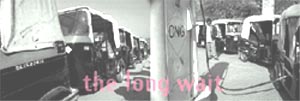Union ministry of petroleum and natural gas
 If the Delhi Transport Corporation and the State Transport Authority do not increase the number of their buses, why should we increase capacity for supply? If I order equipment worth several crore rupees without there being adequate number of buses, how would I answer to my superiors?' Thus Rajiv Sharma, managing director of Indraprastha Gas Limited (igl). The agency, which comes under the Union ministry of petroleum and natural gas (mpng), is a joint venture of the Bharat Petroleum Corporation Ltd and Gas Authority of India Ltd. It was formed after the July 1998 order of the Supreme Court to set up 80 cng fuel stations in Delhi by March 31, 2000. By February 16, 2001, only 60 such stations have come up. The long queues along cng filling stations are blaring testaments to how igl and mpng have failed to deliver. To give the devil its due, igl has had to contend with agencies infamous for their incompetence, including the Delhi Development Authority (dda), municipal authorities and the Delhi Vidyut Board.
If the Delhi Transport Corporation and the State Transport Authority do not increase the number of their buses, why should we increase capacity for supply? If I order equipment worth several crore rupees without there being adequate number of buses, how would I answer to my superiors?' Thus Rajiv Sharma, managing director of Indraprastha Gas Limited (igl). The agency, which comes under the Union ministry of petroleum and natural gas (mpng), is a joint venture of the Bharat Petroleum Corporation Ltd and Gas Authority of India Ltd. It was formed after the July 1998 order of the Supreme Court to set up 80 cng fuel stations in Delhi by March 31, 2000. By February 16, 2001, only 60 such stations have come up. The long queues along cng filling stations are blaring testaments to how igl and mpng have failed to deliver. To give the devil its due, igl has had to contend with agencies infamous for their incompetence, including the Delhi Development Authority (dda), municipal authorities and the Delhi Vidyut Board.
An agency created to make cng easily available, igl plans to hike the price of cng . "The price has been increased to over Rs 17 per kg in Mumbai, we still sell it at a little over Rs 11 per kg and incurring losses. Apart from spending huge amounts on setting up cng stations, transportation of natural gas is also very expensive. I have to show profits to my superiors [read mpng ],' whines Sharma. The ministry has no clue about how to use its fuel pricing policy. It plans to discourage a clean fuel like cng , all the while subsidising a dirty fuel like diesel. The real question, however, is: If public sector agencies prioritise financial viability over public interest, what can you expect of manufacturers of polluting vehicles? The answer to this should come from Ram Naik, minister in charge of mpng .
Availability of cng does not seem to be a problem. Sharma claims only 62 per cent of the existing filling capacity is being utilised. The dispensers do not fill the gas quickly. igl needs a contingency plan to instal additional boosters and compressors. The import duty of 67 per cent on cng dispensing equipment like compressors is phohibitive, says Sharma. The Union ministry of finance is to blame.
Delays in filling cng vehicles have also got to do with the way filling stations have been planned. There are three kinds of the stations. First, there are mother stations, connected directly with the main gas supply line. Second come online stations, which are connected to mother stations through pipelines. And then there are daughter stations, replenished through lorries ferrying cylinders from the mother stations. The villain of this piece is Delhi Traffic Police that fines lorries plying during daytime. Given the inflexible nature of police authorities, the answer is to have more online stations. For that, igl needs land, which places it precariously at the mercy of such bureaucratic bastions as dda .
For the long queues outside the filling stations, Sharma blames the archaic nozzles fitted to autorickshaws of Bajaj Auto Ltd that stretch the duration of filling gas and increase in temperature that creates back pressure in the filling pipe. He wants Bajaj to switch to the more recent ngv1 nozzle, which allows faster flow of gas and minimises the problem of back pressure. The ngv 1 nozzle is used all over the world to reduce filling problems and that both types of nozzles cost the same. But Bajaj cannot switch to ngv 1 nozzles due to legal complications. The Bajaj models have been certified with the archaic nozzles. Changing the nozzle would require the company to go through the process of verification all over again with the Union ministry of surface transport, which can beat all the queues outside all the cng filling stations put together when it comes to delays. The only abundant supply of gas comes in the form of lame excuses from igl and mpng . Sadly, these aren't compressed.
Related Content
- Order of the Supreme Court regarding rising vehicular pollution in Delhi NCR, 20/01/2025
- Draft LNG policy 2021
- Report on the environmental impact of ship breaking method at Alang, Gujarat, 17/09/2020
- Question raised in Rajya Sabha on ethanol blending for reduction in emission, 11/03/2020
- Order of the Supreme Court of India regarding ban on import of pet coke, 26/07/2018
- Order of the Supreme Court of India regarding action plan for air pollution control, 23/07/2018
